
Lake Erie exemption deleted from drilling bill
Bill may be revised by Ohio lawmakers
5/21/2011
A federal ban remains in effect against Lake Erie drilling. State officials will discuss a measure next week.
COLUMBUS—Language that would have specifically exempted Lake Erie was quietly removed this week from a controversial bill to open state lands to drilling for oil and natural gas.
The move raised the suspicions of environmental groups who already oppose the idea of authorizing drilling in state parks, forests, and wildlife reserves, as well as the lands of public colleges and universities.
“There’s a federal ban [on Lake Erie drilling], and as long as that’s in place, great,” said Jack Shaner of the Ohio Environmental Council. “But Congress is making noise … Drill-baby-drill mania is sweeping the nation. … Smokey the Bear, the Smoky Mountains, our most treasured parks. Now it looks like Lake Erie could be endangered.”
As originally introduced by Rep. John Adams (R., Sidney), House Bill 133 included a provision stating the Ohio Department of Natural Resources may issue permits and leases for removal of stone, sand, and other minerals “other than oil or gas” from the lake bed.
That’s the closest thing to language addressing a state ban on Lake Erie oil and gas drilling since an executive order signed by former Republican Gov. Bob Taft expired when he left office in early 2006.
Rep. Dennis Murray (D., Sandusky) said he will seek to reinsert the language when the House Agriculture and Natural Resources Committee takes up amendments on Tuesday. The bill could reach the full House floor as soon as Wednesday.
“We still have the federal law for the time being that forbids drilling on or under Lake Erie, but that could be removed at some point,” Mr. Murray said. “I don’t know why [the state] would remove that. I suspect it is a more ideological statement of drill here, drill now, drill everywhere.”
Rep. David Hall (R., Killbuck), the committee’s chairman, said removal of the language does not hint at an agenda to pursue drilling on and under Lake Erie. He said he’s willing to entertain a discussion about putting the lake language back into the bill on Tuesday, but he doesn’t believe that it’s necessary given the federal ban.
“In my comfort zone, I feel strong enough that we wouldn’t need to do that,” he said.
Among the changes made to the bill by the committee last week was the creation of four classifications of land in terms of their suitability for drilling. Because of the federal prohibition on drilling, the bed of Lake Erie would now be considered Class 2.
The environmental groups, however, point out the bill requires a state agency to make “reasonable efforts” to turn Class 2 property into Class 1 land deemed suitable for drilling. Would “reasonable efforts” include lobbying Congress to lift the federal ban?
“I don’t see that at all,” Mr. Hall said. “Looking and talking to the agency, that’s going to be off limits. That’s not even a doable process because of all the issues.”
He said the bill’s language is meant to require a state agency to take steps to “mitigate a few acres here and there” to make Class 2 land eligible for potential drilling.
He envisions that as applying more to southeast Ohio where most of the discussion surrounding drilling and exploration is currently taking place.
Mr. Taft’s successor, Democratic Gov. Ted Strickland, never signed his own executive order enacting a state ban on Lake Erie drilling, but he vowed that he would if the federal ban should ever be lifted.
As a candidate, current Republican Gov. John Kasich also voiced similar support for a state ban.
Contact Jim Provance at: jprovance@theblade.com or 614-221-0496.